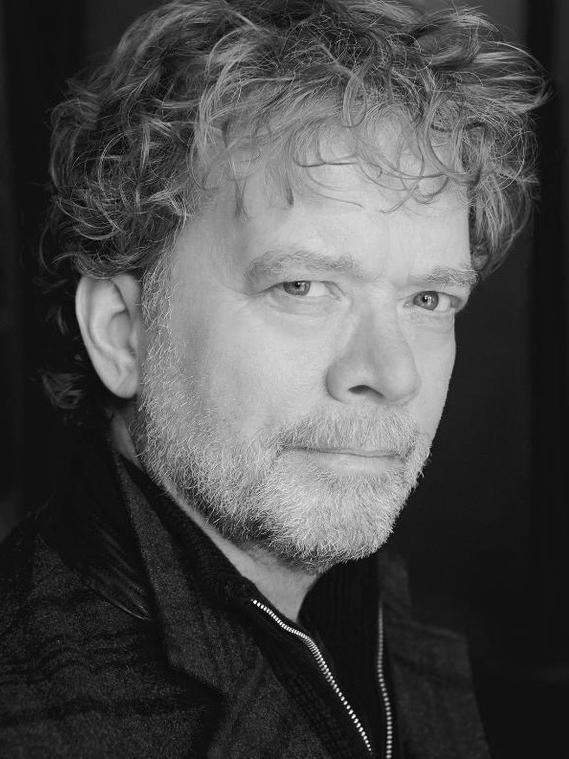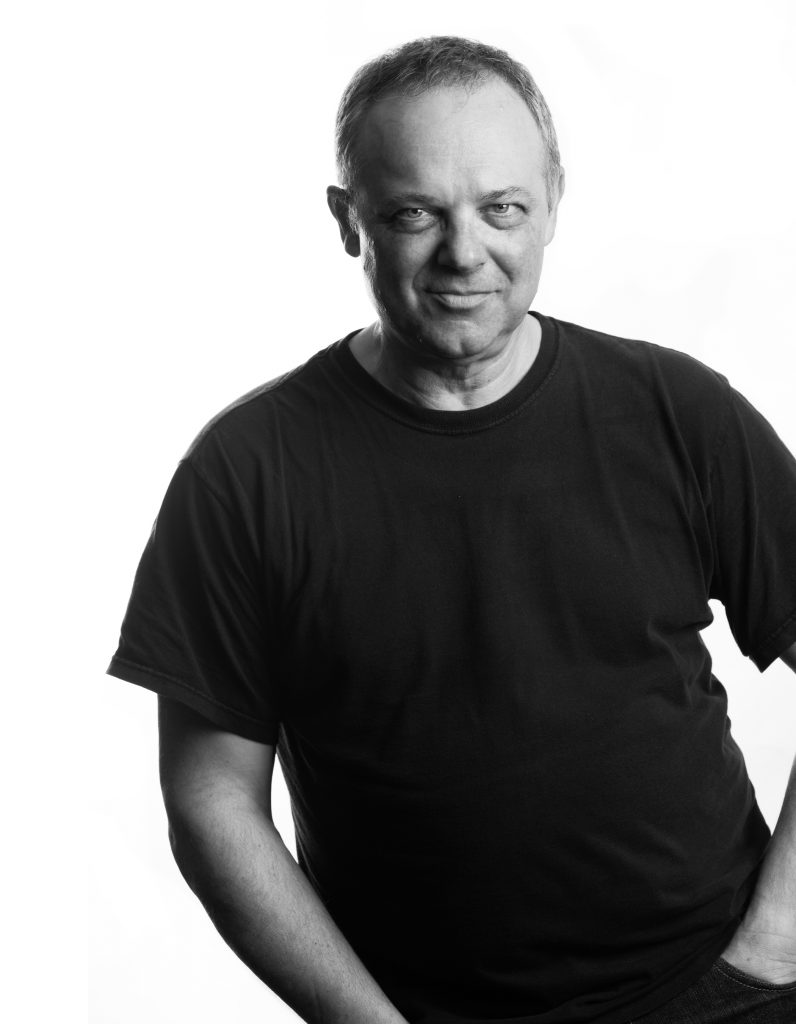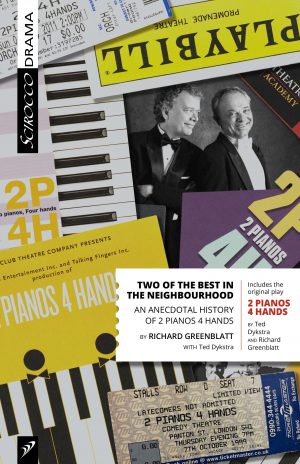Posted June 17, 2022
The Interview – Ted Dykstra and Richard Greenblatt
Ted Dykstra
Ted Dykstra is an actor, director, and playwright, and the co-founder, with wife Diana Bentley, of Toronto’s indie theatre The Coal Mine. Ted is the co-author (with Richard Greenblatt) of the acclaimed and hugely popular play 2 Pianos, 4 Hands. His musical Evangeline was produced in Charlottetown, PEI for two seasons, as well at the Citadel Theatre, and currently he is composing music for Dion, a rock opera based on The Bacchae. Ted has performed on every major stage in Canada, as well as in film and television. He has directed award-winning shows across Canada, including at Soulpepper Theatre, of which he was a founding member. He has received six Dora Mavor Moore Awards, as well as Gemini, Merritt, Sterling, and Chalmers Awards, and has many award nominations for acting, directing, composing, writing, and producing. For him, all of the above pales compared to being the proud father of Theo, Rosie and Henry.
Richard Greenblatt
Richard Greenblatt was born and raised in Montreal and trained as an actor at The Royal Academy of Dramatic Art in London, England. He returned to Canada in the mid-70s and has been working as an actor, director, writer, musician and educator ever since. His work has taken him across the country, throughout the U.S., and in Europe and Japan. The vast majority of his extensive directing work has been with the development and premieres of original scripts, quite a few of which were for Theatre for Young Audiences. He has written and performed two solo shows (Soft Pedalling and Letters from Lehrer), co-authored two plays with Diane Flacks (Sibs and Care), and co-authored the immensely successful 2 Pianos 4 Hands with Ted Dykstra, which they performed almost 1,000 times and has been seen around the world in hundreds of other productions. He has directed and taught acting and directing at most of the top training institutions in Canada, and is the recipient of numerous Dora and Chalmers Awards. He lives in Toronto.
This month, Ted Dykstra and Richard Greenblatt opened in a revival of their smash-hit play, 2 Pianos 4 Hands. Richard’s new book about the play’s origins, development, and continued success, Two of the Best in the Neighbourhood: An Anecdotal History of 2 Pianos 4 Hands, is now available from JGS. The book includes many contributions from Ted as well as from others important to the show’s journey, and it also contains the full text of the play.
Ted and Richard, 2 Pianos 4 Hands is arguably the most successful play in Canadian theatre history, with hundreds of productions of the show taking place over the past twenty-six years. This month marks your triumphant return to Toronto’s Royal Alex Theatre in a revival that’s getting rave reviews. Why do you think this particular play remains so popular with audiences all over the world?
Ted Dykstra: I think it’s because people, when they see it, end up wanting very much to talk about themselves—not only “piano” people, people from all walks of life. The story is universally understood, something writers always like to believe is true of their work, but seldom achieve: It’s lightning in a bottle…
Richard Greenblatt: Several reasons: For me, it’s a reiteration of a long-held belief I try to practice rigorously, which is that specificity is the only way to communicate widely to an audience. Ted and I tried to tell a very specific story based on our experiences growing up as piano nerds, and as soon as we started performing it, people would come up to us and tell us their stories, whether it was about music, or a sport, or whatever dream they had in their youth. Most everybody has similar desires, and they plug their experience into our tale, which I think is the definition of successful storytelling. And we were willing and able to combine it with our absurd senses of humour, the pathos in our journeys, as well as playing challenging, beautiful music. So, it’s a pretty full evening. The lasting image of celebrating two of the best in the neighbourhood is an inclusive concept, I think. It’s both thought-provoking and life-affirming at the same time.
Richard, you chronicled the history of 2P4H in your new book, Two of the Best in the Neighbourhood, which features contributions from Ted (and others who have been a part of the 2P4H story.) Question for you both: What are some of the things you think young artists could learn from reading about the journey the two of you took with this play?
RG: I try to sum it up at the end of the story. One of the most important things I learned was to retain control of one’s artistic and intellectual property. The more successful the show became, the harder it was to fight against “conventional wisdom.” But I think there is no one template for success. If you create a work, it is up to you how it continues to be viewed by the public. You might be smart to listen to those with more experience, but you should never relinquish the final power of the nature of your creation. And, theatre is the ultimate collaborative art form. So, respect your collaborators!
TD: I can never presume to know what someone will learn, I think people are snowflakes. I do know that the story of our journey could be inspiring to some, especially those who are wishing to follow in our footsteps in some way. I know Billy Bishop Goes to War by John Gray with Eric Peterson inspired the hell out of me when I saw it as a teenager. And their success with it was very similar to our journey, success in America, and continuing to perform it decades later.
Approximately how many times have you performed the play by now? Did you have to look at a script before you started rehearsing for this latest production, or is it just part of your DNA by now? Is there anything special about performing the show this time?
TD: Almost a thousand, I believe. I have not read or looked at the script for 26 years! Now if only the piano playing was that easy…
RG: We’ll be around 1000 performances by the end of this run! The script and remembering the dialogue was not an issue for me, although both Ted and I felt we wanted to make some small changes since we last performed it nine years ago. The world is a very different place since 2013. But the biggest issue after a long hiatus is some of the piano playing, especially the first movement of the Bach D Minor Piano Concerto which we play at the end of the show. After all, we are professional actors and writers, not professional classical pianists. I started practising seriously (i.e., every day) about two months before rehearsals began. That aspect of the show remains extremely challenging for both of us. But a lovely thing about doing the play now 26 years later is the ease with which we can approach the story. We know it intimately, and can communicate both the comedy and the drama with a light touch by just concentrating on being present, without having to prove anything, and let the story reveal itself.
How often do you play the piano when you’re not rehearsing for the show? What’s your favourite kind of music to play for fun?
TD: I go in waves. In the pandemic I started learning a Mozart Sonata and was playing a lot. I compose a lot of music so I’m always noodling, whether on the piano or in my electronic world in the basement.
RG: I don’t play piano as much as I’d like. I will noodle when I have time or pick up some piece of music from my daughter Amelia’s RCM Grade 9 repertoire book. I have in the past taken on a project of learning a challenging piece, like I did a few years ago with Bach’s Italian Concerto. I’d love to work my way through the Goldberg Variations. That might be my next project.
Can each of you tell us about a moment from the 2P4H experience that stands out in your mind?
RG: It’s hard to pick just one moment from a 26-year journey. There were many moments from Japan which were memorable, such as when we first performed there and were totally convinced that they were perplexed and bored, but they were in fact loving it, just giggling into their hands and being totally silent in order not to miss anything. Openings in new countries, like New York or London were always pretty amazing – in many different ways. For me, it was mostly when someone would tell us that they had had a traumatic break from the piano as teenagers, which we were told quite often. They told us they had not touched the instrument for many years, but after seeing the show and laughing at so much, as well as experiencing the cathartic emotions of our story, they were anxious to start playing again. That was always extremely gratifying to me.
TD: There really are too many. I was very moved this time around on opening when we entered at the top to bow and people cheered for us so loud that it overwhelmed me. That was so nice. I mean we’re so lucky to have had this happen to us, and to still have an audience.



